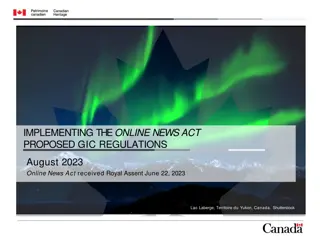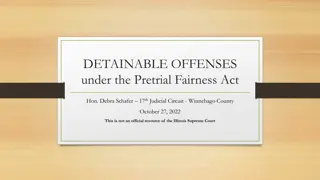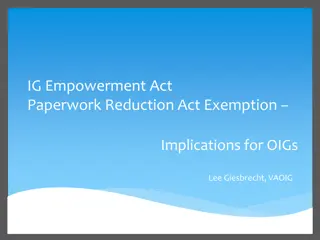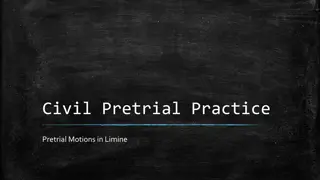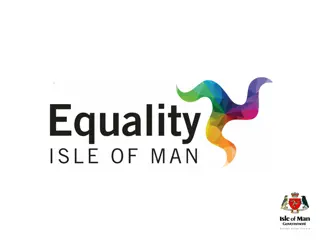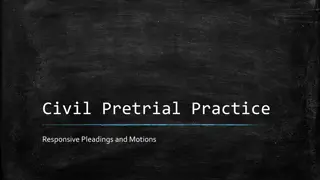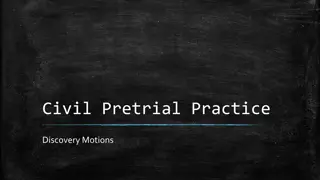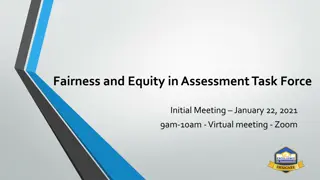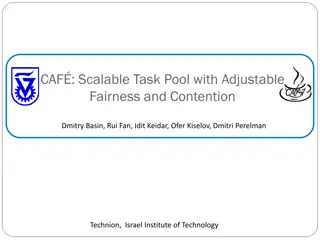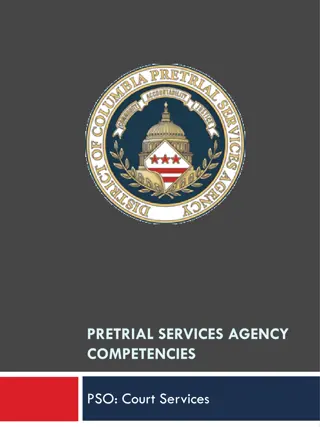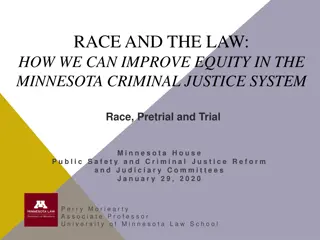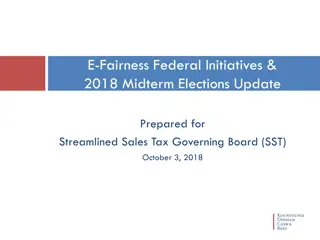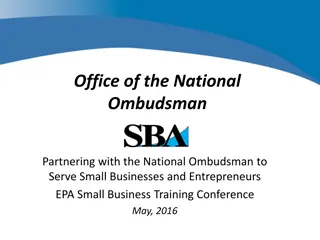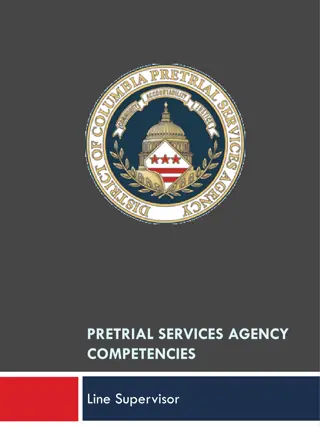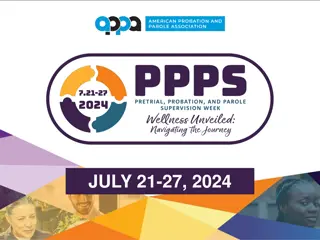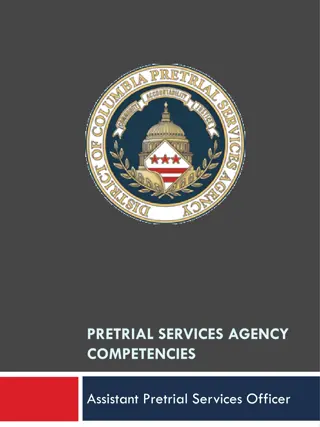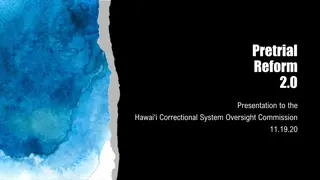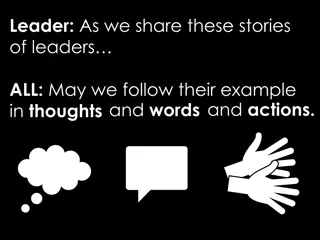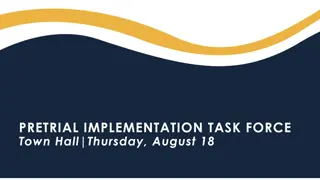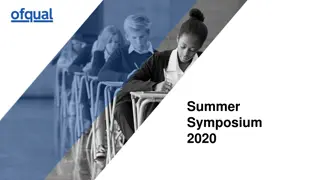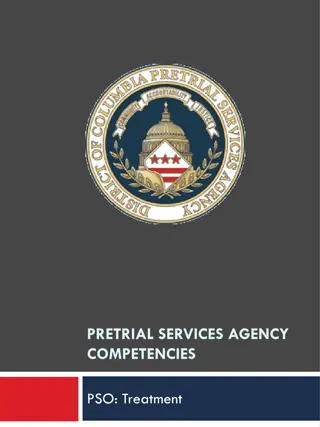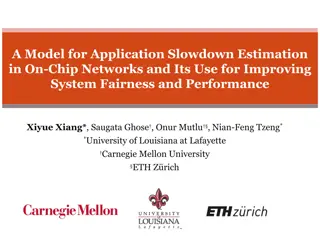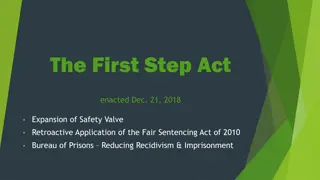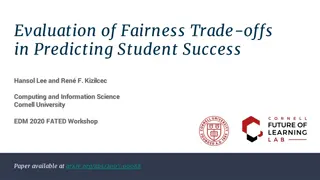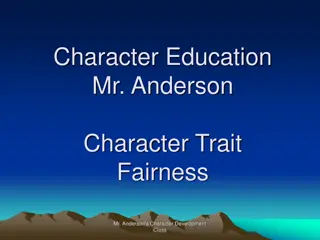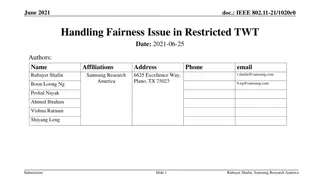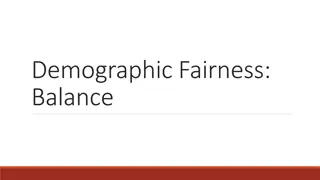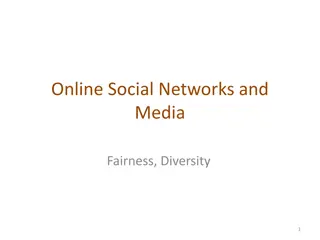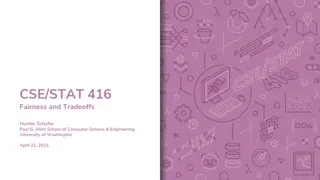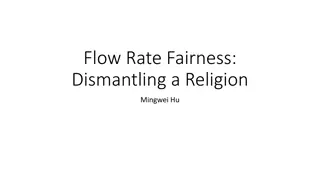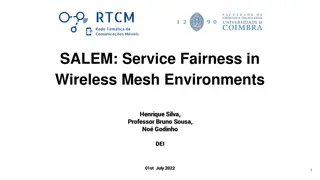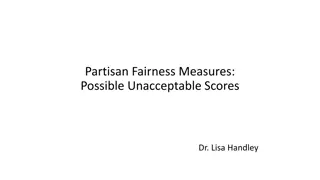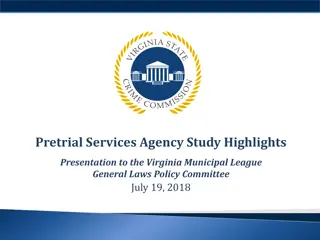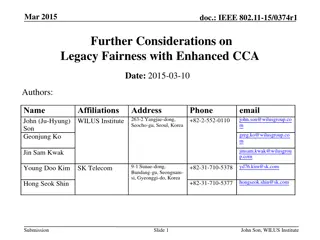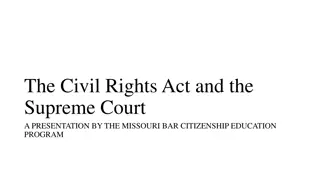Residency Requirements in Awarding Academic Certificates: A Critical Examination
Exploring the significance of residency requirements in the context of academic awards at MJC, this analysis delves into the current practices, reflections on fairness and responsibility, as well as comparisons with other institutions like Delta College. The discussion questions the implications of
2 views • 23 slides
Academic Promotions Round 2024
This briefing session provides an overview of the academic promotions process for the 2024 round at Queen Mary University, emphasizing the framework for career development, evidence-based application, quality over quantity, workload allocation, fairness, and consistency. It highlights the key aspect
9 views • 24 slides
Online News Act Regulations Overview
The Online News Act, which received Royal Assent in August 2023, aims to enhance fairness and sustainability in the Canadian news marketplace through a Bargaining Framework. The Act specifies criteria for platforms to fall under its regulations, outlining the process for obtaining exemptions and ens
0 views • 10 slides
Guide to Detainable Offenses under the Pretrial Fairness Act
The Pretrial Fairness Act allows for pretrial release for all persons charged with offenses before conviction, except in cases of detainable offenses where dangerousness or willful flight is involved. The state must prove by clear and convincing evidence that the defendant poses a real and present t
1 views • 26 slides
Understanding Implications of IG Empowerment Act and Paperwork Reduction Act
The IG Empowerment Act provides beneficial provisions for Inspector Generals (IGs) such as exemptions from certain acts, including the Computer Matching Act and Paperwork Reduction Act. The Paperwork Reduction Act requires federal agencies, including IGs, to obtain OMB clearance before conducting su
1 views • 25 slides
Understanding Pretrial Motions in Limine in Civil Pretrial Practice
Pretrial motions in limine (MIL) play a crucial role in civil pretrial practice by seeking evidentiary rulings in advance to control the introduction of evidence at trial. These motions aim to prevent the admission of irrelevant, inadmissible, or prejudicial evidence and can also facilitate the intr
1 views • 17 slides
Equality Act 2017: Ensuring Equal Access and Protection from Discrimination
The Equality Act 2017 aims to harmonise and extend statutory protection from discrimination for a wider range of people in various areas such as employment, goods and services, education, public functions, premises, and associations. It identifies nine protected characteristics including race, sex,
3 views • 39 slides
Civil Pretrial Practice: Understanding Responsive Pleadings and Motions
Introduction to responding to a lawsuit in civil pretrial practice, covering the timing, deadlines for service of complaint, types of responses (answer, motion), default judgment consequences, and the importance of filing an answer to defend against allegations.
0 views • 15 slides
Discovery Motions in Civil Pretrial Practice
In civil pretrial practice, discovery motions play a crucial role when the opposing party fails to respond adequately to formal discovery requests. These motions include Motion to Compel, Motion to Compel Further, and Motion to Deem Facts Admitted. By filing these motions, parties can seek court ord
0 views • 17 slides
Exploring Fairness and Prejudice Through the FuF Game
Delve into themes of fairness, prejudice, and immigration through a unique game experience where players must navigate unclear rules and unfair treatment. Reflect on the parallels between the game and real-life situations faced by immigrants and newcomers to Canada, highlighting the importance of fa
0 views • 11 slides
Fairness and Equity in Assessment Task Force Meeting Overview
The Fairness and Equity in Assessment Task Force is committed to establishing guidelines to ensure fairness in assessment processes at the University of Florida. The task force members are tasked with developing models and guidelines for faculty and staff to promote equitable assessment practices. R
1 views • 29 slides
Scalable Task Pool with Adjustable Fairness
Explore CAF, a scalable task pool with adjustable fairness and contention, offering a solution to the inherent scalability problems of FIFO queues. The system allows for control over the level of relaxation, providing more fairness or less contention as needed. With a focus on bounded non-FIFO pools
5 views • 26 slides
PSO Court Services Competencies: Knowledge and Skills for Pretrial Services Agency
This content outlines the competencies required for Pretrial Services Officers (PSOs) in Court Services, focusing on knowledge of diagnostic systems, regulatory requirements, organizational protocols, mental health conditions, and more. It details the expectations, skills, and competencies PSOs need
0 views • 16 slides
Improving Equity in Minnesota's Criminal Justice System
Dive into the racial disparities present in the Minnesota criminal justice system, focusing on pretrial and trial stages, bail issues, and pretrial detention facts. Explore the impact on marginalized communities and the need for reform to promote fairness and justice.
4 views • 12 slides
Update on E-Fairness Federal Initiatives & 2018 Midterm Elections
The Supreme Court decision in South Dakota v. Wayfair has paved the way for states to require out-of-state sellers to collect and remit sales tax. Various federal legislative bills have been introduced in the 115th Congress regarding e-fairness. The Marketplace Fairness Act, S.976, aimed to establis
0 views • 36 slides
Serving Small Businesses and Entrepreneurs: Office of the National Ombudsman
The Office of the National Ombudsman, created under the Small Business Regulatory Enforcement Fairness Act of 1996, acts as a mediator between small businesses and federal agencies, addressing concerns about regulatory enforcement. Encouraging regulators to prioritize compliance assistance over pena
2 views • 16 slides
Line Supervisor Competencies in Pretrial Services Agency
As a Line Supervisor in a Pretrial Services Agency, the competencies revolve around leveraging human capital resources, leading others, building relationships, demonstrating organizational savvy, effective communication, delivering quality results, taking initiative, problem-solving, decision-making
0 views • 16 slides
Understanding Pretrial, Probation, and Parole in the Criminal Justice System
Explore the concepts of pretrial, probation, and parole in the United States. Learn about their definitions, functions, and significance in the criminal justice process. Discover the differences in costs between incarceration and community supervision. Gain insights into current trends and national
0 views • 17 slides
Assistant Pretrial Services Officer Competencies
Assistant Pretrial Services Officers are required to demonstrate knowledge and proficiency in various competencies such as supervision procedures, court services, drug testing protocols, technical expertise, organizational knowledge, and communication skills. They handle tasks related to supervising
0 views • 18 slides
Pretrial Reform 2.0 Presentation for Hawaii Correctional System Oversight Commission
Presentation discussing key recommendations for pretrial reform in Hawaii including fairness in bail reports, faster bail processes, and fewer release conditions. The presentation also addresses recommendations that have not been implemented, legislative history, and target populations for reform ef
0 views • 9 slides
Embracing Fairness: Lessons from Leaders and Wilma Rudolph
Explore the inspirational stories of leaders and Wilma Rudolph, reflecting on fairness, equality, and compassion. Reflect on what we can learn, address unfairness in our world, and create a fair environment at school. End with a call to action for treating each other fairly every day by establishing
0 views • 13 slides
Illinois Judicial Branch Public Relations Plan Pretrial Implementation
The Illinois Judicial Branch's Pretrial Implementation Task Force is working to implement recommendations and prepare stakeholders for changes in the law to be effective from January 1, 2023. Led by Judge Stuckert, the Task Force provides guidance on the Pretrial Fairness Act, emphasizing the import
0 views • 20 slides
Insights from Summer Symposium 2020: Assessments, Fairness, and Results
The Summer Symposium 2020 provided valuable insights on various topics, including assessments, fairness in grading, and looking ahead to results in the education sector. Key discussions included the process of awarding grades, ensuring fairness for all students, and considerations for interpreting a
0 views • 48 slides
Pretrial Services Agency Competencies in Treatment: Knowledge and Skills Assessment
This content outlines the competencies required in the area of treatment by pretrial services agencies. It focuses on the knowledge and skills related to substance-related treatment, mental health disorders, supervision procedures, treatment programs, regulatory knowledge, HISP monitoring policies,
0 views • 22 slides
A Model for Application Slowdown Estimation in On-Chip Networks
Problem of inter-application interference in on-chip networks in multicore processors due to NoC contention causes unfair slowdowns. The goal is to estimate NoC-level slowdowns in runtime and improve system fairness and performance. The approach includes NoC Application Slowdown Model (NAS) and Fair
0 views • 25 slides
Changes Introduced by the First Step Act of 2018
The First Step Act, enacted in December 2018, brought significant changes such as the expansion of safety valve, retroactive application of the Fair Sentencing Act of 2010, and initiatives to reduce recidivism and imprisonment. Sections like 402, 403, and 404 address safety valve broadening, clarifi
0 views • 27 slides
Santa Cruz County Probation Department Pretrial Services Overview
The Santa Cruz County Probation Department emphasizes public safety, evidence-based practices, and efficient use of jail space through pretrial services. By implementing actuarial risk tools, providing tailored supervision, and utilizing evidence-based techniques, they aim to reduce pretrial detenti
0 views • 22 slides
Evaluation of Fairness Trade-offs in Predicting Student Success
This study delves into fairness concerns in predicting student success, examining trade-offs between different measures of fairness in course success prediction models. It explores statistical fairness measures like demographic parity, equality of opportunity, and positive predictive parity. Through
0 views • 11 slides
Character Education: Understanding Fairness and Equity in Mr. Anderson's Class
Explore the core character traits of fairness and equity taught in Mr. Anderson's Character Development Class. Fairness is exemplified through impartial treatment, sharing, and abiding by rules. Equity involves correcting mistakes, not taking advantage of others, and ensuring fair shares. Discover k
0 views • 27 slides
Handling Fairness Issue in Restricted TWT Operation
Proposal addressing fairness vs. channel utilization tradeoff in restricted Target Wake Time (TWT) operation for IEEE 802.11 networks. Solution suggested for underutilization of TWT schedules due to early completion of latency-sensitive transmissions, mitigating fairness concerns while optimizing ch
0 views • 14 slides
Achieving Demographic Fairness in Clustering: Balancing Impact and Equality
This content discusses the importance of demographic fairness and balance in clustering algorithms, drawing inspiration from legal cases like Griggs vs. Duke Power Co. The focus is on mitigating disparate impact and ensuring proportional representation of protected groups in clustering processes. Th
0 views • 36 slides
Ensuring Fairness and Diversity in Online Social Networks and Media
Embracing fairness and diversity in online social networks and media is imperative to combat discrimination and biases. From addressing data correctness and completeness to understanding processing algorithms and disparate treatment, the quest for fairness through blindness and individual fairness i
0 views • 39 slides
Understanding Fairness and Tradeoffs in Machine Learning
Explore the concept of fairness in machine learning models and how biases can impact decision-making processes. Delve into various sources of bias and frameworks for understanding unintended consequences. Using college admissions as an example, discover different approaches to achieving group fairne
0 views • 32 slides
Challenges of Flow Rate Fairness in Network Resource Allocation
Addressing the concept of flow rate fairness in network resource allocation, this content explores its limitations and challenges. Despite being a goal in protocols like TCP, the practicality and enforceability of flow rate fairness are questioned. It highlights the inadequacy of flow rate as a meas
0 views • 15 slides
SALEM: Service Fairness in Wireless Mesh Environments
SALEM project focuses on managing resources intelligently in Wireless Mesh Networks to ensure fairness among services with heterogeneous technologies. Implementing a fairness model incorporating delay, reliability, and energy objectives, SALEM is tested in smart city scenarios. Through MILP optimiza
0 views • 11 slides
Analysis of Partisan Fairness Measures and Efficiency Gaps in Redistricting Plans
This analysis delves into partisan fairness measures and efficiency gaps in various redistricting plans challenged in Ohio, Pennsylvania, Wisconsin, and Michigan. Dr. Lisa Handley and other experts discuss thresholds for unconstitutional plans and the impact of lopsided margins. The Efficiency Gap,
0 views • 7 slides
Virginia State Crime Commission Pretrial Services Study Highlights
The Virginia State Crime Commission has conducted a comprehensive study on pretrial services agencies, focusing on the statutory mission and the pretrial process. The study examined the use of pretrial services supervision for defendants, indigent defendant placement, fees associated with supervisio
0 views • 31 slides
Comprehensive Overview of Washoe County Pretrial Services Program
Delve into the history, statistics, and functioning of the Washoe County Pretrial Services Program led by Heather Condon. Explore the goals, teams, assessment, and supervision processes. Gain insights into successful outcomes, judicially imposed bail, and statistics from various phases. This detaile
0 views • 12 slides
Legacy Fairness Enhancement in IEEE 802.11 Networks: Further Considerations
Investigating legacy fairness issues in IEEE 802.11 networks, this document explores methods to address throughput starvation of legacy stations due to enhanced Channel Clear Assessment (CCA) in High Efficiency (HE) stations. Two fairness methods, Legacy Frame Protection and PPDU Size Reduction, are
0 views • 9 slides
The Civil Rights Act of 1964 and the Supreme Court
In the 1960s, Congress passed the Civil Rights Act of 1964, a pivotal legislation that prohibited discrimination in public accommodations. This act represented a significant shift in focus towards minority rights. The Supreme Court's past rulings on the Civil Rights Act of 1875 influenced Congress t
0 views • 24 slides


